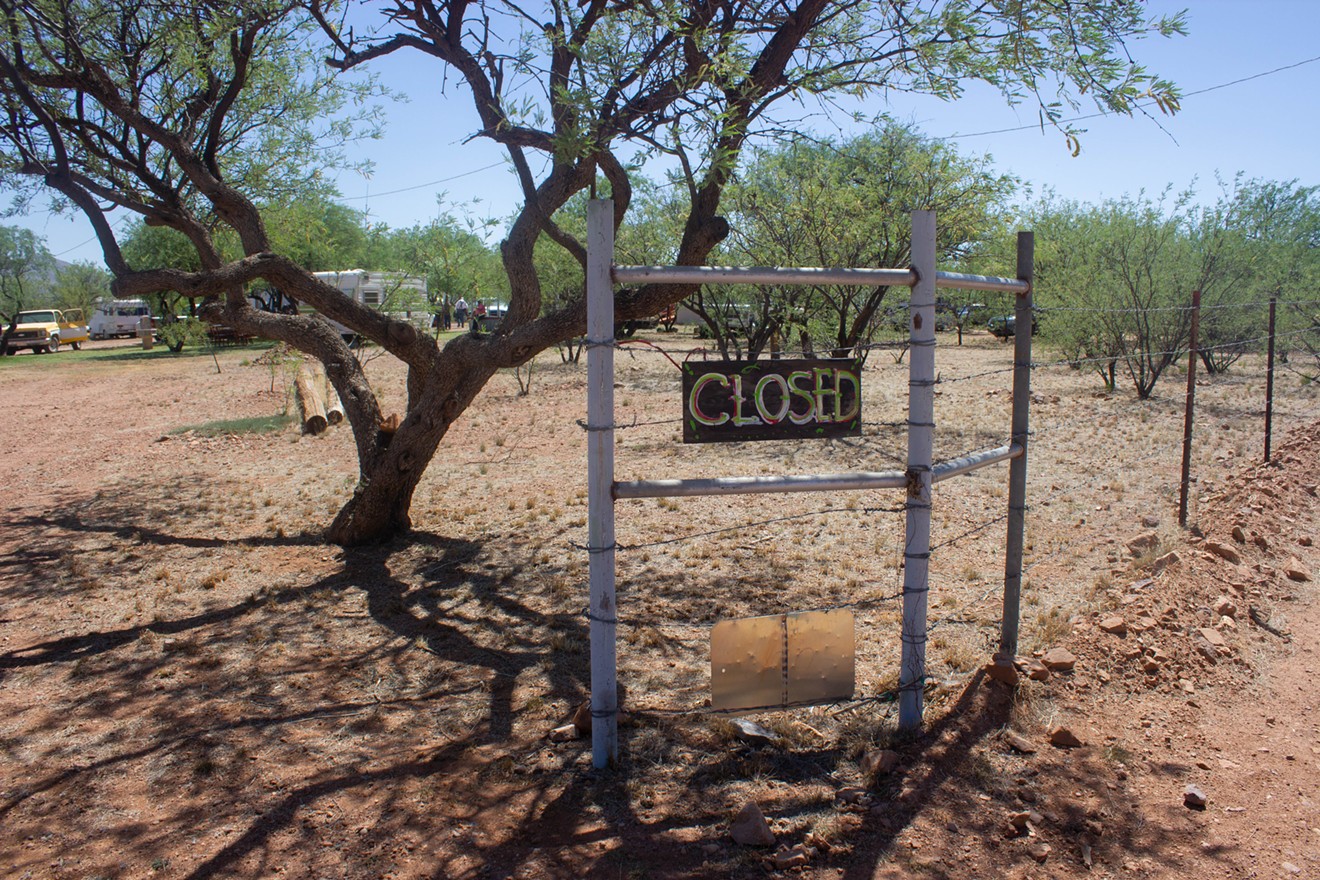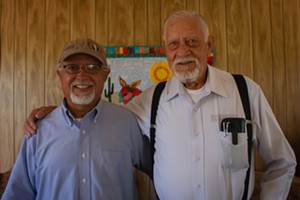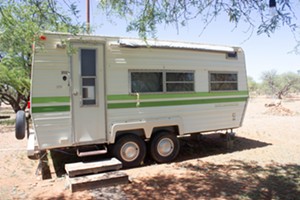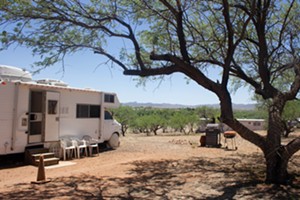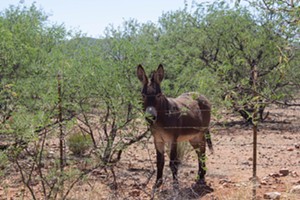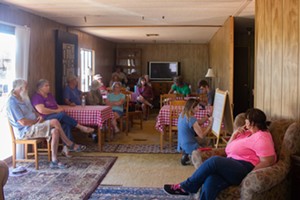But recently, it's been Pima County's zoning ordinances — and an anonymous local tipster — that have upset a motley collection of birdwatchers, off-gridders, retired veterans, and aging draft dodgers.
Over the past two months, a beloved local campground and the town's recycling center shut down after anonymous complaints to the county revealed that they were operating outside the law. The impact might have been insignificant in a larger city like Tucson or Phoenix. But Arivaca doesn't have that many businesses to begin with: just a small general store, an artists' co-op, the Saturday farmer's market, an RV park, a Mexican restaurant and bar, a ranch for troubled boys, and Gasdsen Coffee, where you can buy tie-dyed T-shirts and nag champa incense along with your soy latte. ("Migratory birds love shade-grown coffee," the sign outside informs visitors.)
The Arivaca Recycling Center was the first to close. Two years ago, Eli Buchanan, who grew up in town and now works for Arivaca's nonprofit internet service provider, had gotten the idea of opening a recycling facility on land that his parents own. Previously, residents had to take their recyclables to Green Valley, which is more than 45 minutes away and involves traveling through a Border Patrol checkpoint and several low-lying washes that flood during the monsoon season. Often, that meant that rusted cans and old mechanical parts wound up in the town dump.
Buchanan created an online fundraiser that raised more than $1,400, and used the money to buy drop-off bins that he placed around town. Then, two months ago, his mother received a letter telling her that she was out of compliance with county zoning ordinances, since the property was intended for residential use only.
"As long as I've been doing this, I've been in touch with the county," Buchanan said. "They basically told me as long as no one complains, it's okay — do what you want."
But someone did complain — Buchanan can't say for sure who it was. While he could theoretically apply for a conditional-use variance and eventually try to get the property rezoned, that would mean paying thousands of dollars for legal fees and environment assessments, he said. And the recycling center has never made that kind of money.
He'd also need to put up fencing and barbed wire to discourage scavenging, add a paved parking lot and handicapped parking spots, and have a restroom for employees. But he doesn't have any employees, and actively encourages scavenging, since the whole purpose of the recycling center was to allow people to repurpose things that others no longer want.
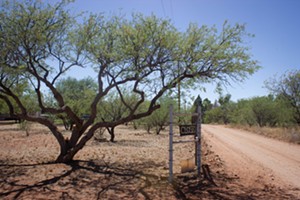
In order to legally reopen La Siesta Campgrounds, Steve Rendon might have to pay for the cost of paving Hardscrabble Road.
Antonia Farzan
Steve Rendon, the manager of La Siesta Campgrounds, ran into a similar dilemma. Some 40 years ago, his father, Oscar Rendon, purchased 10 acres of land on Hardscrabble Road in Arivaca with the intention of eventually selling his home in Tucson and retiring there. But Oscar, a former electrical contractor and engineer, didn't actually end up retiring until last year — he's now 85 — and the land remained mostly empty.
Meanwhile, Steve had been working for a medical laboratory in Los Angeles. Just before the recession struck, he'd purchased a coffee shop and the historic La Siesta Motel in South Tucson. Then his job became obsolete and he was laid off. Unable to keep the motel and coffee shop afloat, he filed for bankruptcy. The bank foreclosed on his house. Returning to Tucson without many options, he asked his parents what they thought about opening a campground in Arivaca.
In 2013, La Siesta Campgrounds opened. With no budget for marketing, he had to get creative.
"I went on Craiglist and announced the first annual vintage travel trailer show in Arivaca, Arizona," he recalled. "And believe it or not, they came with their vintage cars and their trailers from all over."
The campground quickly became popular with people who own retro vintage trailers, as well as hunters and the parents of kids at the nearby boys' ranch. The Rendons frequently hosted retreats for combat-wounded veterans and the children of fallen soldiers, often charging next to nothing when nonprofit groups wanted to use the campground.
"It's kind of got a hippie camp vibe to it," said Julie Beck, who owns a 1965 Shasta compact trailer and made multiple trips to La Siesta for meetups hosted by Sisters on the Fly, a women's outdoor adventure club. "It’s authentic and genuine. You meet people from all walks of life."
Steve Rendon maintains that when he applied for a business license from the state, he'd asked if he needed to do anything else and was told that he was all set. He didn't run into any problems until earlier this year, when someone filed an anonymous complaint with Pima County's zoning office. Inspectors visited the site, and determined that he was operating a campground without the required permits.
"We don’t drive around looking for issues — we don’t go on the internet looking for advertisements," said Chris Poirier, a county planning official. "We just rely on neighbor complaints to investigate."
Since the campground didn't have a permit, the county had no way of knowing where sewage was going, Poirier said. Inspectors determined that the septic tank on the property was too small for a commercial campground, and that too many units were plugged into one electric pedestal, creating a potential safety risk.
Rendon told Phoenix New Times that he orders port-a-potties whenever there's an event taking place at the campground, and that the septic tank gets cleaned out three or four times a year. Most of people who camp at La Siesta have vintage trailers with their own holding tanks and get their power from solar panels or generators, he added.
"We're not an RV park, and we're not a resort," he said.
Still, in order to legally operate as a campground, Rendon learned, he'd have to get a conditional-use permit from the county. La Siesta doesn't make a profit, he said, and the environmental impact study alone would cost thousands of dollars. Plus, he'd likely have to pay to pave the dirt road that leads to the campground, or lay down gravel to reduce the amount of dust that cars kick up.
Unwilling to take out a loan that he might not be able to pay back, he took down the sign on the gate and canceled his upcoming reservations, declaring the campground closed for business.
Rendon said he doesn't know who was behind the anonymous complaint, or if it was the same person who had targeted the recycling center. But people in Arivaca have their suspicions.
A few years ago, some residents — particularly those who volunteered with humanitarian groups like People Helping People In The Border Zone — started getting anonymous hate-filled letters in the mail. Then businesses that advertised in the Southern Arizona Connection newspaper received phone calls telling them that they shouldn't support a publication that was run by left-wingers.
Many locals suspect that the individual who was behind the letters and the phone calls now has a new hobby: sending anonymous tips to the county. (None were willing to identify the suspected culprit on the record, out of fear that doing so would mean inviting harassment.)
At a community meeting held on Saturday, multiple residents speculated that the same anonymous tipster had also been responsible for the recent disappearance of the community bulletin board at the Arivaca post office. For years, the bulletin board had been the place to go to get information about local events. Then, one day, someone complained to the U.S. Postal Service's headquarters in Washington, D.C., and the bulletin board was gone.
"The guy's a real asshole," declared Ken Buchanan, who'd called Washington, D.C., himself to find out if there was any way of getting the bulletin board back. He'd learned that there wasn't: Legally, the post office was only allowed to display official notices authorized by the federal government.
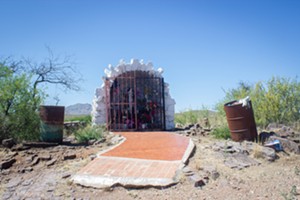
To get to Arivaca, you have to pass through a border patrol checkpoint and drive for 23 miles on a winding road that passes cattle ranches and roadside shrines.
Antonia Farzan
"I hope the person responsible finds the cool glee they get from ruining a person's livelihood enough to make up for the coldness in their life," read one post on the Southern Arizona Connection Facebook page.
Officially considered an unincorporated community since it lacks a municipal government, Arivaca was predominantly Mexican-American prior to World War II, according to the Arizona Daily Star. In the 1970s, hippies started showing up, drawn to Southern Arizona by the good weather, cheap cost of living, and abundance of open land. Some pitched teepees down by the Mexican border; others lived in vans and school buses.
Despite some initial hostility, local ranchers and prospectors eventually got used the presence of the hippies. "Arivacans, hippies now tolerate each other" read the headline of one story published in the Tucson Daily Citizen in 1976.
These days, solar-powered off-the-grid homes have replaced converted school buses and teepees. But the same kind of live-and-let-live attitude still exists in Arivaca — for the most part.
"We're kind of like the Old West," said Dan Kelly, a longtime resident dressed in a Vietnam Veteran baseball cap and jeans. "We've got cowboys, ranchers, retired folks, small business owners, artists and artisans, writers ... and except for this one character, nobody sticks their nose in someone else's tent."
Plenty of people in Arizona have never even heard of Arivaca. But if they have, it's likely due to the town's proximity to the Mexican border. Over the past 20 years, the Altar Valley has become an increasingly popular route for drug smugglers and migrants headed north, resulting in the formation of both vigilante militias and humanitarian aid groups on the American side of the border.
In 2009, members of the Minutemen American Defense Corps broke into the home of Raul Flores and his 9-year-old daughter, Bresenia, then shot and killed both of them. Referred to obliquely as "the bad thing that happened here" — everybody in Arivaca knows exactly what that means — the tragedy still hangs over the town. "No Militia, Never Again" bumper stickers are found on the backs of trucks all over Arivaca, as well as on the shelves of the only bar in town.
More recently, some residents have grown fed up with the constant presence of the Border Patrol, and have campaigned to close the checkpoint that they have to pass through in order to shop for groceries in Green Valley or Tucson. National reporters reliably turn to Arivaca when they need a quote from someone who opposes the increased militarization of the border; on Saturday, a local coffee roaster who moonlights as a bongo player informed a visitor that he'd just been interviewed by "Japanese NPR."
County officials' insistence that businesses in Arivaca come into compliance with local zoning laws has added to a growing sense of resentment aimed at the government.
On Saturday, roughly 20 people gathered at La Siesta to try to strategize ways of saving the campground and recycling center. (The time and place for the meeting weren't publicly announced in advance, just in case the anonymous tipster decided to show up.) Many of them expressed frustration with Pima County, arguing that it was unreasonable to expect rural businesses to adhere to the same regulations that apply in Tucson.
"Maybe we can secede," one man suggested.
"I would like to point out that almost every business in this town is not in compliance," a woman in a purple shirt said, noting that only government-owned buildings like the library and the post office have paved parking lots. "Who's next? Are they going to close down our entire community?"
"It's like the big guy picking on the little guy," said Marsha Berlo, a member of Sisters on the Fly who made the five-hour trip from Overgaard for the meeting. "It's not a business that's just sitting here, rolling in the dough. It's a business with heart."
Ultimately, the group decided to start a Change.org petition asking the county supervisors to grant a waiver to both the campground and the recycling center. As of Tuesday morning, 526 people had signed — a number nearly equivalent to Arivaca's entire population.
"It's the people who have been working here who are going to lose out," Dan Kelly said. "There's no employment out here."
Plus, he said of Steve Rendon, "He's just a hell of a nice guy."
Julie Beck, who'd returned home after her first visit to the campground and told her husband that they needed to move to Arivaca, agreed.
"He hired local young people who were homeless and were recovering from drug and alcohol use to work for him and help him improve the park," she said. "He sponsored the town's Halloween events so local kids would have a safe place to trick-or-treat. He worked with the local nonprofits so that his guests could go to a casino night in town where all proceeds would go to low-income seniors who needed propane."
Rendon estimates that the campground had employed roughly 10 people at a time, all contract workers who helped out with housekeeping, groundskeeping, and maintenance. On top of that, he said, his guests almost always ended up spending money in town, whether they were buying groceries at the Arivaca Mercantile or getting drinks at La Gitana.
The campground had also been an affordable place for disabled veterans to live in small trailers, Rendon said. It's unclear where any of them will go once they leave La Siesta.
"We’re hoping that with all this support, the county will at least give us a variance," he said. "If it closes, my parents and I are okay — we'll just live off our retirement. But the community, it would be devastated."

